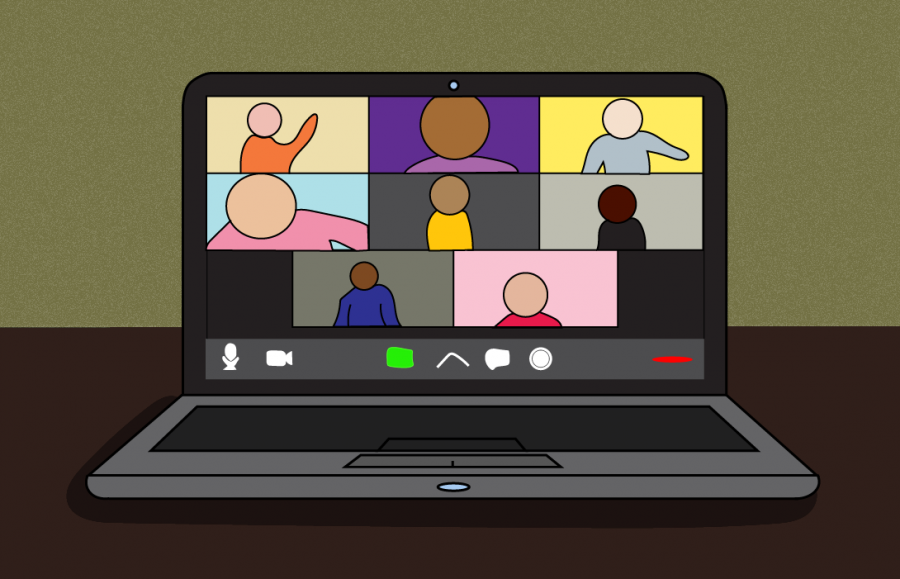Professors’ new normal: Online instruction used during COVID-19 pandemic
Apr 7, 2020
“So, this is my office now,” said journalism professor Benjamin Holden, seated in his backyard facing a swimming pool while his dog lounged in the grass.
Two weeks into online learning, students and professors alike have begun to settle into this bizarre reality — that ‘school’ is no longer a place. Rather, it is something we log on to — from our bedroom or backyard, from the Chicago suburbs or Beijing, China.
For Holden, teaching under these circumstances is guided by a single, fundamental goal: to deliver the same level of academic rigor to his students as before. He has opted for live lectures via Zoom, as it is the closest alternative to human interaction. The technology has certainly proved to be useful, though challenging so far.
“I’m always still a little nervous when I start the class about whether, you know, my wifi’s going to fail,” Holden said. “Most of the classes, at least once, somebody says ‘I can’t hear you,’ or ‘You’re really choppy.’”
Despite these hiccups, Holden persisted with the platform because it gives students the opportunity to ask questions and interact with the professor in real time — something asynchronous learning lacks.
Get The Daily Illini in your inbox!
While the COVID-19 pandemic presents obvious learning obstacles, it has also created unique learning opportunities. In his course, JOUR 210: Newsgathering Across Platforms, Holden has expanded writing assignments to include coverage of the current pandemic. Students were allowed the option to interview classmates who have had newsworthy experiences with COVID-19.
“We went from, ‘Hey, you’re going to do a story about the Champaign City Council’ to ‘You’re doing a story about your own classmate going to India and having to wait in an airport for 16 hours after a 14 hour flight, with no shower, and some with no food,” he said. “So, yes, we changed, or at least gave the option to change the repertorial subjects, because part of what I’m teaching is news judgment and newsworthiness, and there is no story that is more newsworthy than the terrible coronavirus.”
Associate professor of jazz Larry Gray has also found the current circumstances, though devastating, provide valuable experience for his students. Gray currently teaches jazz aural skills and private lessons, while also overseeing small ensembles.
“I actually really dig it,” Gray said. “I see the students’ goal — before we even knew there was a pandemic — in general is to learn how to maintain their product, body of work and identity as an artist, in a computer, because that’s how people are going to find them.”
Like Holden, Gray has opted for live Zoom sessions. The platform serves Gray’s teaching goals in a unique way, as recording is an important part of a musician’s practice. Gray said he feels that seeing and hearing yourself as a musician is an illuminating experience and necessary for self-assessment.
While the platform has provided Gray with unique teaching benefits, it has also presented its own challenges. One of his students, Zoe Willott, senior in FAA, said she misses the healthy competition of the campus environment.
“It’s very easy to stay motivated at school since the environment is a healthy, competitive one, where everyone is pushing each other to do well, but at home it’s difficult because I just get into break mode when I’m there,” Willott said. “It’s also difficult to continue meeting with ensembles since we can’t play together like we do at school.”
Since live collaboration is an important part of his teaching, Gray has had to find other innovative ways to facilitate active collaboration between his students. He uses an online recording portal, known as a digital-audio workstation, to allow students to compose and record music together.
With all of these adjustments, both Gray and Holden are attempting to teach empathetically, keeping in mind how circumstances might be affecting students’ ability to learn and work at full capacity.
“I want to replicate the classroom environment, but I don’t ever want to say, ‘Darn it, why didn’t you just study harder?’ Holden said. “I want to be empathetic, kind and aware that this is a very unusual environment, and I want to support my students.”
Gray also said he was proud of how his students have handled their learning through these difficult changes, being optimistic about their ability to create amidst chaos.
“As musicians, we have to keep going. We have to keep making sound in the midst of all this craziness — that’s all the students have,” Gray said. “So I’m inspired by them, really, when they come up and play something, and I’m like, ‘Wow, that’s great. That’s beautiful.’”






